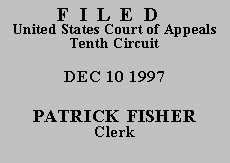

| WILMA J. SIMMONS,
Plaintiff-Appellant, v. KENNETH S. APFEL, Commissioner, Social Security Administration,(*) Defendant-Appellee. |
|
Claimant Wilma J. Simmons appeals from an order of the magistrate judge(1) affirming the final decision of the Commissioner of Social Security denying her application for disability and supplemental security income benefits. We review the Commissioner's decision to determine whether it is supported by substantial evidence and whether the correct legal standards were applied. See Washington v. Shalala, 37 F.3d 1437, 1439 (10th Cir.1994).
This court has reviewed Ms. Simmons' brief and contentions,(2) as well as the entire record on appeal. Based on that review, we affirm for substantially the reasons set forth in the magistrate judge's well-reasoned order dated January 6, 1997. See Simmons v. Chater, 950 F. Supp. 1501 (N.D. Okla. 1997). We find only one issue warranting further comment: Ms. Simmons' contention that, despite the fact that the ALJ determined she could only perform unskilled work, the jobs identified by the vocational expert (VE) as ones she could perform are classified as semi-skilled jobs in the Dictionary of Occupational Titles (DOT). She maintains that the DOT controls when a VE's testimony contradicts it, citing to Campbell v. Bowen, 822 F.2d 1518, 1523 n.3 (10th Cir. 1987).
We agree with the magistrate judge, for substantially the same reasons set forth in its detailed order, that no direct contradiction between the VE testimony and the DOT's rating of skill classifications is present here. In addition to the reasons given by the magistrate judge, we note that Soc. Sec. Ruling 82-41 indicates the imprecise nature of determining whether a job is unskilled:
Jobs are unskilled when persons can usually learn to do them in 30 days or less. The majority of unskilled jobs are identified in the [DOT]. It should be self-evident that restaurant dishwashers are unskilled. It may not be self-evident that other jobs can be learned in 30 days or less, . . .[and i]n these cases, occupational reference materials or specialists should be consulted. . . . Even though semiskilled occupations require more than 30 days to learn, the content of work activities in some semiskilled jobs may be little more than unskilled.
Soc. Sec. Ruling 82-41, Soc. Sec. Rep. Serv., Rulings 1975-1982, 849-50 (emphasis supplied). Moreover, 20 C.F.R. § 404.1566(e) specifically contemplates the use of vocational experts in determining complex issues such as the matching of a claimant's work skills with available occupations. Further, the DOT cautions that occupational information provided only "reflects jobs as they have been found to occur, but they may not coincide in every respect with the content of jobs as performed in particular establishments or at certain localities." DOT, Vol. I, at xiii (4th ed. 1991). We also note, as did the magistrate judge, see Simmons, 950 F. Supp. at 1508, that the VE testified Ms. Simmons would be able to perform a third job, "escort driver," which Ms. Simmons does not claim to be inconsistent with the DOT. Because we hold there was no direct conflict between the VE's testimony in this case and the DOT, we do not reach the question of whether the DOT creates a rebuttable presumption as to job classifications.
The judgment of the United States District Court for the Northern District of Oklahoma is AFFIRMED substantially for the reasons set forth in its order dated January 6, 1997.
Entered for the Court
Circuit Judge
*. Pursuant to Fed. R. App. P. 43(c), Kenneth S. Apfel is substituted for Shirley S. Chater, Commissioner of Health and Human Services, as the defendant in this action.
**. This order and judgment is not binding precedent, except under the doctrines of law of the case, res judicata, and collateral estoppel. The court generally disfavors the citation of orders and judgments; nevertheless, an order and judgment may be cited under the terms and conditions of 10th Cir. R. 36.3.
1. The parties consented to proceed before the magistrate judge pursuant to 28 U.S.C. § 636(c)(1).
2. We note that Ms. Simmons did not present her claims to the Appeals Council. Nonetheless, the court will not apply a waiver rule in this case because, at the time she appealed to the Appeals Council, Ms. Simmons did not have notice of James v. Chater, 96 F.3d 1341, 1344 (10th Cir.1996) (holding "[i]ssues not brought to the attention of the Appeals Council on administrative review may, given sufficient notice to the claimant, be deemed waived on subsequent judicial review.").